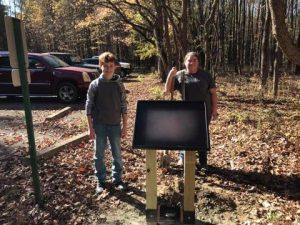4-H service project cleans Lincoln Trail State Park
University of Illinois Extension Service — December 26, 2020
Clark County 4-H members Colin Perron and Rachel Morris, both 13, installed boot cleaning stations at Lincoln Trail State Park on October. (Photo courtesy of U of Illinois Extension)
In 1830, a young Abraham Lincoln traveled from Indiana with his family to settle in Illinois. Almost two centuries later, new young leaders are following in his footsteps by preserving the state’s natural legacy at his namesake park.
Clark County 4-H members Colin Perron and Rachel Morris put their hands to higher service this fall by installing boot brushing stations at Lincoln Trail State Park to help keep out invasive species.
“Colin and Rachel share a love for nature and interacting with nature in responsible and respectful ways,” says Tresa Morris, their 4-H club leader and the Clark County Shooting Sports Coordinator. “This community service project was perfect for the two of them.”
Hikers can use boot brushing stations to remove plant materials from their footwear before and after moving through natural areas reducing the risk of moving invasive species seeds.
In September, the Morton Arboretum in Lisle in partnership with Play, Clean, Go put out a call statewide for volunteer groups to install stations at preselected at-risk sites. Morris noticed the nearby 1,023-acre Lincoln Trail State Park was on the list and got to work.
Colin and Rachel, both 13, met with Tom Hintz, the park’s Site Superintendent, on October 31 to install stations at two trailheads leaving room for a sign with instructions and information about invasive species.
One of the goals of the Illinois 4-H Shooting Sports program is to instill a love of outdoor sportsmanship and conservation while teaching safe and responsible handling and use of firearms.
“Installing boot brush stations is a win-win service project,” says Curt Sinclair, the state Extension specialist in 4-H Shooting Sports and Environmental Education. “They are really effective at helping control the spread of non-native species like Garlic Mustard and it raises awareness for our youth members but also everyone who uses that trail.”
Invasive species are non-native plants, animals and insects. They have no natural predators and some can spread quickly and aggressively, competing for resources and changing the balance of the ecosystem.
Peggy Doty, Illinois Extension Environmental and Energy Stewardship educator, says research has shown that many invasive plants end up in new areas as a part of human activity.
“Hikers and walkers unknowingly carry seeds stuck to our clothes and in the treads of our footwear,” Doty says. “Our boots and shoes are the biggest problem because plant seeds get wedged into the treads and drop out in different habitats.”
Using a boot brush station reduces the number of potential seeds that may fall out randomly along a trail where they do not belong.
Looking ahead, Hintz and Morris plan to grow the partnership by coordinating programs that get youth outside and learning about natural resources.
To learn more about Illinois 4-H Shooting Sports or to learn more about installing a cleaning station contact Curt Sinclair at sinclair@illinois.edu.







